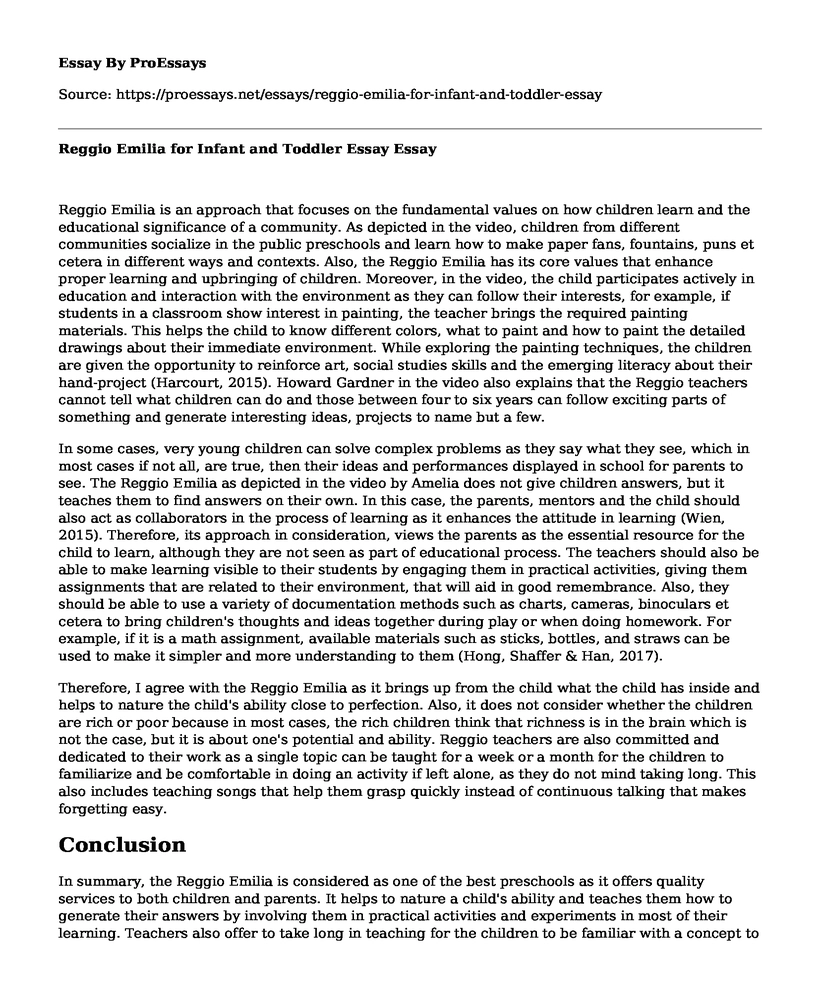Reggio Emilia is an approach that focuses on the fundamental values on how children learn and the educational significance of a community. As depicted in the video, children from different communities socialize in the public preschools and learn how to make paper fans, fountains, puns et cetera in different ways and contexts. Also, the Reggio Emilia has its core values that enhance proper learning and upbringing of children. Moreover, in the video, the child participates actively in education and interaction with the environment as they can follow their interests, for example, if students in a classroom show interest in painting, the teacher brings the required painting materials. This helps the child to know different colors, what to paint and how to paint the detailed drawings about their immediate environment. While exploring the painting techniques, the children are given the opportunity to reinforce art, social studies skills and the emerging literacy about their hand-project (Harcourt, 2015). Howard Gardner in the video also explains that the Reggio teachers cannot tell what children can do and those between four to six years can follow exciting parts of something and generate interesting ideas, projects to name but a few.
In some cases, very young children can solve complex problems as they say what they see, which in most cases if not all, are true, then their ideas and performances displayed in school for parents to see. The Reggio Emilia as depicted in the video by Amelia does not give children answers, but it teaches them to find answers on their own. In this case, the parents, mentors and the child should also act as collaborators in the process of learning as it enhances the attitude in learning (Wien, 2015). Therefore, its approach in consideration, views the parents as the essential resource for the child to learn, although they are not seen as part of educational process. The teachers should also be able to make learning visible to their students by engaging them in practical activities, giving them assignments that are related to their environment, that will aid in good remembrance. Also, they should be able to use a variety of documentation methods such as charts, cameras, binoculars et cetera to bring children's thoughts and ideas together during play or when doing homework. For example, if it is a math assignment, available materials such as sticks, bottles, and straws can be used to make it simpler and more understanding to them (Hong, Shaffer & Han, 2017).
Therefore, I agree with the Reggio Emilia as it brings up from the child what the child has inside and helps to nature the child's ability close to perfection. Also, it does not consider whether the children are rich or poor because in most cases, the rich children think that richness is in the brain which is not the case, but it is about one's potential and ability. Reggio teachers are also committed and dedicated to their work as a single topic can be taught for a week or a month for the children to familiarize and be comfortable in doing an activity if left alone, as they do not mind taking long. This also includes teaching songs that help them grasp quickly instead of continuous talking that makes forgetting easy.
Conclusion
In summary, the Reggio Emilia is considered as one of the best preschools as it offers quality services to both children and parents. It helps to nature a child's ability and teaches them how to generate their answers by involving them in practical activities and experiments in most of their learning. Teachers also offer to take long in teaching for the children to be familiar with a concept to enhance independence during work.
References
Harcourt, D. (2015). Nothing without joy: The key principles of the Reggio Emilia approach. Educating Young Children: Learning and Teaching in the Early Childhood Years, 21(3), 26.
Hong, S. B., Shaffer, L., & Han, J. (2017). Reggio Emilia inspired learning groups: Relationships, communication, cognition, and play. Early Childhood Education Journal, 45(5), 629-639.
https://youtu.be/XVv5ZL9nlgs
Wien, C. A. (2015). Emergent curriculum in the primary classroom: Interpreting the Reggio Emilia approach in schools. Teachers College Press.
Cite this page
Reggio Emilia for Infant and Toddler Essay. (2022, May 17). Retrieved from https://proessays.net/essays/reggio-emilia-for-infant-and-toddler-essay
If you are the original author of this essay and no longer wish to have it published on the ProEssays website, please click below to request its removal:
- Personal Essay Example: Beam Sir - My Chemistry Teacher
- Co-Teaching an Online Action Research Class - Essay on Education
- Postgraduate Dentistry Personal Statement
- Research Paper on Children and Technology
- Research Paper on Single-Parent Families and Effects on Children
- Essay Example on Developing Critical Thinking for Evidence-Based Practice
- Essay on Tech-Innovated Education: Dubai Private Schools Lead the Way







